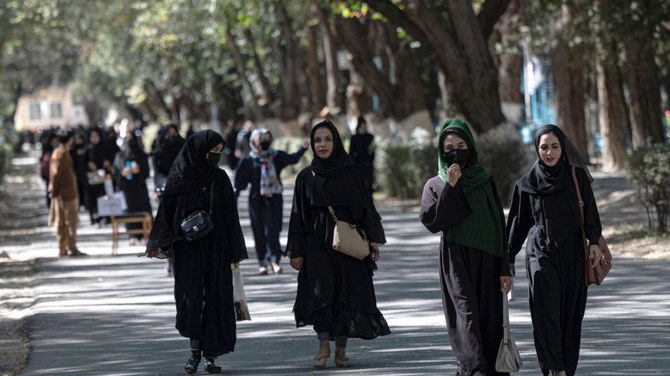
Three years ago — a year prior to taking control of Afghanistan — the deputy leader of the Taliban made a statement via an open letter published in The New York Times, titled “What We, the Taliban, Want.” Sirajuddin Haqqani stated that the type of government would depend “on a consensus among Afghans … in a consultative manner of genuine respect to agree on a new, inclusive political system in which the voice of every Afghan is reflected and where no Afghan feels excluded.” He also stated that all Afghan people would have equal rights and the rights of women to work and education would be protected.
Early last year, I wrote an article for Conservative Home with UK MP Rehman Chishti, highlighting concerns that there were signs that women’s education was not being fully upheld. Afghanistan has a history of having strong, politically active, well-educated women. The previous government’s first lady was an active defender of human rights and peace, youth empowerment and female entrepreneurship. Despite societal challenges, Afghanistan’s women were ambassadors and politicians.
However, in December 2022, girls and young women left their homes in the morning as usual, but upon arrival at their places of education were told that all schools, colleges and universities had received a directive from the Ministry of Education that any females above the sixth grade must return home. This led to protests in the cities, particularly following previous bans on women in parks, gyms and public baths, essentially removing women’s freedoms to socialize and walk freely outdoors for anything other than shopping or visiting.
Some say the move was due to a lack of funds. If so, this is a false saving. It is well established that having women in the labor market increases the scope of the economy and boosts gross domestic product. Women require an education if they are to enter the labor market. The UN estimates that Afghanistan’s economy lost $5 billion over the first 18 months following the Taliban takeover of the country, with half of the population suffering from a critical food shortage and with unemployment at extremely high levels.
This has been hindered further by the freezing of some aid into the country; further sanctions will only harm the people. And even more so in the lower-income families that were relying, for example, on their daughter’s higher education to bring in a strong wage and support the family, particularly in harder-hit one-parent families. It is predicted that the economy will decrease by a further $1 billion if women lose the right to education in the long term.
It is well established that having women in the labor market increases the scope of the economy and boosts gross domestic product.
Dr. Bashayer Al-Majed
Some government officials say this is a temporary measure to allow time for courses for women to be restructured to fit better with the government’s principles. If so, this could have been done in a staged manner to support women’s and girls’ learning in the interim.
The removal of women’s freedoms is, of course, having a dire effect on mental health and many highly educated women that can leave the country wish to do so. Healthy, educated young women who are suddenly not allowed to study, learn or work are having to remain in the home. Of course, after the COVID-19 lockdowns, this is all the more relatable to the rest of the world. However, with COVID-19, we all knew there would be an end to the pandemic, but what is the end goal here in Afghanistan? How do women make it through this time if education is banned after the age of 10? So many skills will be lost and many lives will also be lost, whether through starvation, poor mental health or a lack of medical care due to a shortage of well-trained and educated female medical staff, such as doctors, gynecologists and nurses. Mortality rates are already reported to be higher.
This must be a frightening and uncertain time for so many. Afghanistan’s women deserve the equality and education they were promised. This is a financially challenging time globally, it is not the time to remove half of the potential future workforce by refusing them an education. And workers cannot work if they are starving. This is the time to build Afghanistan’s economy. It needs all of its possible workforce in top form and it needs to build strong relationships with the global community to secure both aid and future trade deals.
Women are a valuable asset to the economy and, as the digital world strides forward, there are many remote-working roles that fit with the new government regime of women spending more time in the home. But first women must be taught the relevant technological skills. Women must feel valued and respected and have a voice in their future. Afghanistan needs its people to be a strong, cohesive force, to all work together to help one another and build their economy and society. At the same time, the international community needs to step forward and peacefully help move this situation forward to support Afghanistan’s women.
• Dr. Bashayer Al-Majed is a professor of law at Kuwait University and a visiting fellow at Oxford.
Twitter: @BashayerAlMajed












